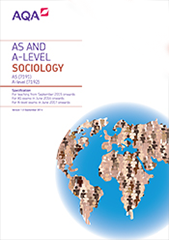3.2 Research Methods and Topics in Sociology
Research Methods
Students must examine the following areas:
- quantitative and qualitative methods of research; research design
- sources of data, including questionnaires, interviews, participant and non-participant observation, experiments, documents and official statistics
- the distinction between primary and secondary data, and between quantitative and qualitative data
- the relationship between positivism, interpretivism and sociological methods; the nature of ‘social facts’
- the theoretical, practical and ethical considerations influencing choice of topic, choice of method(s) and the conduct of research.
Topics in Sociology
The study of these topics should engage students in theoretical debate while encouraging an active involvement with the research process.
The study should foster a critical awareness of contemporary social processes and change, and draw together the knowledge, understanding and skills learnt in different aspects of the course.
In their study of these topics, students should examine:
- topic areas in relation to the two core themes (socialisation, culture and identity; and social differentiation, power and stratification)
- both the evidence of and the sociological explanations for the content listed in the topic areas below.
Throughout, students should be encouraged to use examples drawn from their own experience of small-scale research.
Attention should be given to drawing out links with other topics studied in this specification.
Culture and Identity
Students are expected to be familiar with sociological explanations of the following content:
- different conceptions of culture, including subculture, mass culture, folk culture, high and low culture, popular culture and global culture
- the socialisation process and the role of the agencies of socialisation
- the self, identity and difference as both socially caused and socially constructed
- the relationship of identity to age, disability, ethnicity, gender, nationality, sexuality and social class in contemporary society
- the relationship of identity to production, consumption and globalisation.
Families and Households
Students are expected to be familiar with sociological explanations of the following content:
- the relationship of the family to the social structure and social change, with particular reference to the economy and to state policies
- changing patterns of marriage, cohabitation, separation, divorce, childbearing and the life course, including the sociology of personal life, and the diversity of contemporary family and household structures
- gender roles, domestic labour and power relationships within the family in contemporary society
- the nature of childhood, and changes in the status of children in the family and society
- demographic trends in the United Kingdom since 1900: birth rates, death rates, family size, life expectancy, ageing population, and migration and globalisation.
Health
Students are expected to be familiar with sociological explanations of the following content:
- the social construction of health, illness, disability and the body, and models of health and illness
- the unequal social distribution of health chances in the United Kingdom by social class, gender, ethnicity and region
- inequalities in the provision of, and access to, health care in contemporary society
- the nature and social distribution of mental illness
- the role of medicine, the health professions and the globalised health industry.
Work, Poverty and Welfare
Students are expected to be familiar with sociological explanations of the following content:
- the nature, existence and persistence of poverty in contemporary society
- the distribution of poverty, wealth and income between different social groups
- responses and solutions to poverty by the state and by private, voluntary and informal welfare providers in contemporary society
- organisation and control of the labour process, including the division of labour, the role of technology, skill and de-skilling
- the significance of work and worklessness for people's lives and life chances, including the effects of globalisation.
